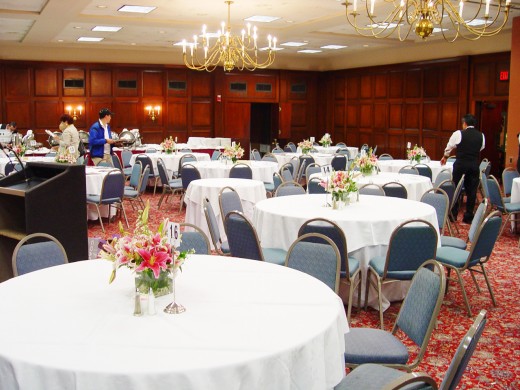How NOT to Promote Convention Space to Professional Meeting/Event Planners

What Planners Want
What are most meeting/event planners looking for in a convention center? Does the appeal of a business event revolve around the waterpark, golf course, or luxury spa? Better yet—are meeting planners looking for a convention center that can actually render their own job function useless... a convention center where planners can just put up their feet and "leave the details" to someone else?
A few years back, at the Meeting Place Mexico 2009 conference and exposition held in Puerto Vallarta, I listened to Martin Sirk, CEO of the International Congress and Convention Association, lament what he called “lousy advertising” practices on the parts of convention facilities worldwide. At the time, I was the editor in chief and communications liaison for a Chicago media/marketing firm geared toward the events industry, and I will never forget the message I heard loud and clear that day. Without apology, Sirk blasted the kind of advertising imagery that portrays business travel in terms of vacation amenities. Moreover, he called out a cheap marketing tactic used by far too many facilities—one intended to suggest the capabilities of onsite convention services, but which actually implies the job (read: livelihood) of event planning is just an inconvenience planners would rather leave to some other professional.
Emphatically, Sirk urged facility representatives, “Please, please, do not put adverts together showing a businessman with his shoes taken off and his trousers rolled up, sitting on a chair by the beach with a slogan that says something along the lines of ‘Meeting planners who come to our destination, don’t worry about a thing—we’ll do it all.’ Do not do advertising which tells them their job is not important and you’ll do it for them.”

Sound familiar? Sirk’s comments illustrate a widespread tactic by many different types of convention facilities, intended to market business event offerings in a way that appeals to target audiences. But who is that target—the business meeting attendee or the business meeting planner? Well, if you're the one developing the ad copy, you might want to consider who is responsible for selecting the convention space in the first place. Despite the fact that many facilities offer world-class, state-of-the-art meeting and event space, much advertising content tends to focus on leisure attributes, even in convention industry magazines that exist to promote the business functions of such properties. Many of these facilities’ marketing slogans and imagery convey, almost word for word, the “we’ll do it all” message Sirk considers so contradictory—and so insulting—to a convention planner’s needs.
What's the big deal? What is it about this particular message that so rubs event planners the wrong way? Well, when you consider the roles and responsibilities of a professional planner, it's not hard to see the disconnect. Back in 2011, while I was the editor of a print magazine serving the meetings industry of the greater Midwest region, 20-year professional event planner Sirena Evans produced a series of articles for my readers, outlining a practical approach to beginning a business as an event planner. Since then, she has expanded on that content to produce a Kindle book entitled Become an Event Planner: The Three Necessary Steps to Begin Your Event Planning Career (2013).
In that book, Evans writes, "Of course, an event planner is the person who coordinates every last detail of an event, no matter how small or how large that event might be. He or she arranges everything from the choice of venue to menu selection, from the entertainment to the décor, from the type of staging to the choice of background music. The planner is the one who decides between a tropical theme or an arctic theme, or dreams up something that's never been done before. He or she is able to take a simple concept or idea and turn it into a living, breathing, dynamic entity that impacts the lives of people on many different levels."
So if you're one of the people whose job it is to promote convention space to one of those people, then let me ask you a question: do you really believe that individuals who are so personally involved and invested in their events will be attracted to a facility that suggests they might just "leave all the details" to any other human being at any point of the planning process?
And just what details are you proposing to handle, anyway? Another long-time contributor to that little meetings industry magazine on the prairie, Susan Friedmann, CSP is better known as the author of Meeting and Event Planning for Dummies (2003), a 344-page guide to the basics of a successful business meeting or event. That's right, I said "the basics." In this oldie-but-a-goodie, Friedmann provides a solid, thorough overview of event planning fundamentals including the nitty-gritty details about budgeting, food and beverage service, safety and security concerns, and so much more that I can't even begin to summarize with justice.
So if you're a representative of a convention facility, and you think I'm kidding when I say a professional meeting or event planner will probably not be inclined to "just relax" while onsite at your facility, just click the Look Inside icon on Amazon and browse through a few of the sample checklists Friedmann provides at the back of her book. Does it look like a job that might induce anyone to "just relax" and enjoy the spa while the big day plays out in your ballroom or boardroom or banquet center?
This misguided marketing message is more than just an ill-considered dig at a little-understood profession, however. For some meeting and event planners, it's also a threat to job security. Yet despite highly publicized company crackdowns on business event spending due to perceived corporate irresponsibility at the time of Sirk's address to Meeting Place Mexico attendees more than five years ago, today, one can still open the pages of any convention industry magazine and find at least one example of such “lousy advertising” targeted toward event designers and decision makers. What, exactly, does this type of promotional message say to the people who are responsible for booking convention business at your facility? With respect to an industry that demands its professionals grow ever more adept at proving their ROI, what do you think those professionals hear when an ad in an industry magazine tells them their work is superfluous?
The medium is not necessarily the enemy, since meetings industry surveys show that some convention planners do still turn to trade magazines to assist them in facility research. However, these same surveys also demonstrate that convention planners rely more and more heavily on online research to save time and effort in the facility research processes. When it comes to promoting convention space to professional meeting planners, trending research continues to show that an expensive, ill-defined print advertisement depicting an amenity-based experience is much less effective in gaining convention business than is the provision of detailed, current facility information in an industry-specific online resource.
Why are professional meeting planners turning away from print advertisements to find their next convention facilities?
1. Mixed messages.
First of all, the marketing message contained in many print advertisements throughout the traditional meetings media tends to be off base when considering current industry trends and world events. In today’s marketplace, professional convention planners are called upon, more than ever, to define the financial worth and return on investment of their meetings and events. Responding to the pressures of an over-arching crackdown on “executive excess,” effective convention facility advertising must reflect a property’s specific business benefits for groups. As the economy creeps back from the public shaming of the not-so-long-ago government bailout days, in which meetings and events faced scathing media and government scrutiny, today’s convention planners still cannot afford to allow their gatherings to be perceived as frivolous or wasteful. Hence, many professional meeting planners are unlikely to be inspired by marketing messages that portray images of the pool, the spa, the golf course, or whatever other luxury accommodations happen to coincide with a property’s convention assets. Yet many convention industry advertisements continue to focus on amenities, rather than the business event attributes convention planners need to see today.
2. Vanishing viability.
Second, despite the solid credibility and respect that print advertising has enjoyed within the convention industry in the past, trends and forecasts indicate that convention planners, just like consumers at large, are turning to the World Wide Web to find the resources they need. Although niche readers can be slightly more tenacious than general audiences, convention industry magazines are not invincible to the market fluctuations that affect mainstream print publications. The downward spiral of print is such a fact of life nowadays as to hardly garner headlines anymore. Yet one by one, industry magazines are still losing business and shutting the doors because their audiences are making the same move toward online-only information that has changed the world forever in most other markets. While many convention facilities have traditionally clung to magazines as a “safe” and “known” advertising channel, all signs point toward the increasing ineffectiveness of these publications to reach the widest audience of industry decision-makers.
3. Incomplete information.
Third, a catchy advertising slogan is not the key to gaining convention business. Unlike vacation travelers, convention planners are not likely to be swayed by a cute catch phrase. They need solid information regarding convention facilities, square footage, technological capabilities, food and beverage service, lodging accommodations, transportation and accessibility, service quality, and the almighty dollar. Even a full-page advertisement in a trade magazine does not afford the space needed to detail a facility’s roster of convention options. A website or even an online directory, on the other hand, might offer unlimited space for text. Plus, online reviews are priceless when it comes to sharing firsthand impressions. Even if every last detail isn’t made available online, most Web platforms offer the capability for meeting planners to request specific details or identify the exact representative who can answer their questions. In addition, it goes almost without saying that an online presence is far less expensive and enjoys much wider, longer-term exposure than a print advertisement—which loses visibility as soon as a publication hits the recycle bin.

Give Them What They Want
In short, when it comes to promoting convention space to attract professional meeting planners, an informative online outlet that provides quick and easy access to detailed information about the facility is the way to go. That said, the promotional message still matters, and no convention planner wants to be told his or her job can be replaced by the facility that wants the business. An online resource that delivers “just the facts” will almost always provide a more effective marketing strategy and a greater return on investment when compared to a stand-alone magazine advertisement—especially when that advertisement depicts a pool and a spa no self-respecting convention planner will have time to visit anyway.



